中职英语基础模块unit
高教社中职英语基础模块1unit课件

Guidance and Practice of Listening Skills
01
Provide feedback on listening performance: After students complete the listening tasks, provide feedback on their performance, pointing out areas for improvement and highlighting good practices
01
02
03
04
Learning objectives and requirements
Basic vocabulary and expressions related to vocal topics
Common language structures and functions used in verbal English
01
02
Practice listening skills
Design listening activities that allow students to practice their listening skills, such as gap filling exercises, multiple choice questions, or true/false statements
Unit theme and background
Objectives
To develop basic English language proficiency in speaking, listening, reading, and writing
中职英语 基础模块1 Unit 1 Personal and Family Life
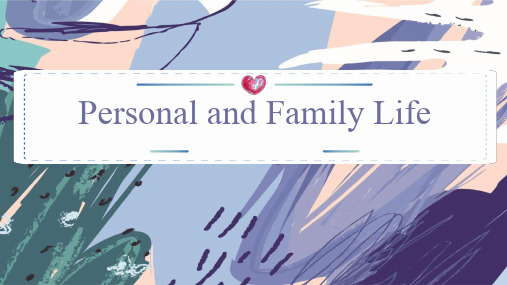
重点详解
1. family name given name Liu Xingting is a flight attendant.
Xinting is her given name. Xu Ming is a firefighter. Xu is his family name.
单词卡片 middle school student
younger sister
twin sisters especially
community
n.初中生 n.妹妹
n.孪生姐妹 adv.尤其是
n.社区
单词卡片 cook
Chongyang Festival handmade
family name delivery person
我的一名消防员,我的妻子是一名教师。
(2)He wants to work as a teacher in Western China. 他想在中国西部当一名教师。
重点详解
4.manage.v动词 manager.n 名词
英译汉: 1.He manages a department. 2.He is a manager.
n.厨师 重阳节 adj.手工的 n.姓 n.送货员
单词卡片 given name flight attendent firefighter vocational ancestor
n.名 n.空乘人员 n. 消防员 adj.职业的
n.祖先
单词卡片 address formal
situation
as for name after
little
三、选择题。
中职英语 基础模块1 Unit 1 Personal and Family Life
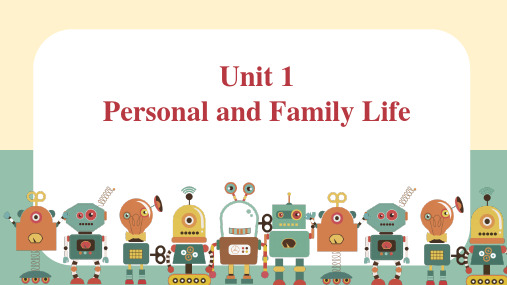
work as a teacher in Star Vocational(职
业的) High School.
记一记:记记交际语
交际语: Hello!My name is ...... . I'm...... . 你好!我的名字是.... 我是...(职业) Hi! My name is ...... . My family name is..... . 你好!我叫....。我姓.....。 Nice to meet you! My first name is... 很高兴见到你!我的名字是....。 Good morning/afternoon/evening! 早安!/午安! / 晚安! How do you do! 你好! I work as.... 我的工作是....
Smith Brown Brown
given name
first name (名字)
family name
last name (姓)
中国是姓在前名在后 西方是名在前姓在后
找一找:找出打招呼的英文表达
1. Hello! my name is Li Ting. I'm a
doctor. my family name is Li.
Words game
点击每个礼物,说出相应单词和释义
doctor
firefighter
delivery person
flight attendant
teacher
1. think and match. 将以下自我介绍与图中人物相匹配
52 3 4 1
1. Hello! my name is Li Ting. I'm a doctor. my family name is Li. 2. Hi! My name is Zhang Yifan. I'm a delivery person. Yi fan is my given name. 3. Nice to meet you! I'm Liu xinting. I'm a flight attendant. How can I help you? 4. Good morning!I'm Xu Ming, a firefighter. My given name is Ming means brightness. 5. Good afternoon! I'm Yu xinling. I work as a teacher in Star Vocational High School.
中职英语基础模块2 Part 02 Unit 3 Internship Reading
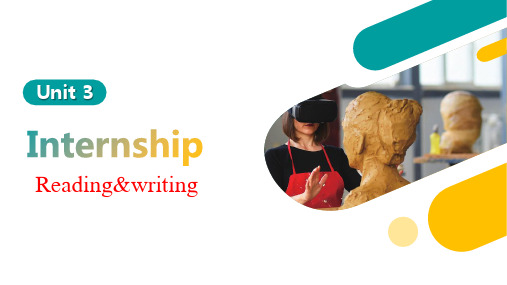
The Human Resources Department will keep track of each trainee’s practice by checking job descriptions and
procedures with the trainee’s manager and mentor, ensuring the truth of work experience.
definition /ˌdefɪˈnɪʃn/ n. 定义
arrangement /əˈreɪndʒmənt/ n. 安排 instruction /ɪnˈstrʌkʃn/ n. 指导;指示
Think and discuss. 思考并讨论在实习过程中你最重视的因素。
work experience
工作经历
come. And practice will turn interns to qualified full-time hires.The Human
fulfilling tasks
完成任务
useful skills
有用的技能
teamwork
团队合作
learning from colleagues
向同事学习
creating resumes
做简历
Read and tick. 阅读网页,勾选出文本类型。
Huaxia Company Internship Program
CLEAR ANDຫໍສະໝຸດ DETAILED TRAINING
Training include sections before, during and after the trainee’s work in the company.
中职英语高教版(2021)基础模块1第1单元《Understanding》课件
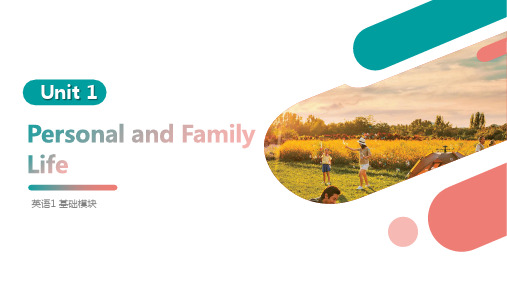
Warming up
早在五千多年以前,中国就已经 形成姓氏,并逐渐发展扩大,世 世代代延续。在中华姓氏文化中, 《百家姓》是我国流行最长,流 传最广的一种蒙学教材。
Culture Understanding
Names
People in English speaking countries tend to put given name before family name. But the majority (大部分) of Chinese people put family name before given name. Family names are so important to us because they tell who our ancestors (祖先) are and where we are from. However, the ways of addressing (称呼) people are the same in English and in Chinese. We can address people by their full names. For example, Yuan Longping and Winston Churchill. In formal (正式的) situations, we usually use Mr, Mrs or Ms before a family name. For example, Mr Yuan and Mr Churchill. And between close friends, we can use given names. For example, Longping and Winston.
Culture understanding生词
中职英语基础模块一unit7
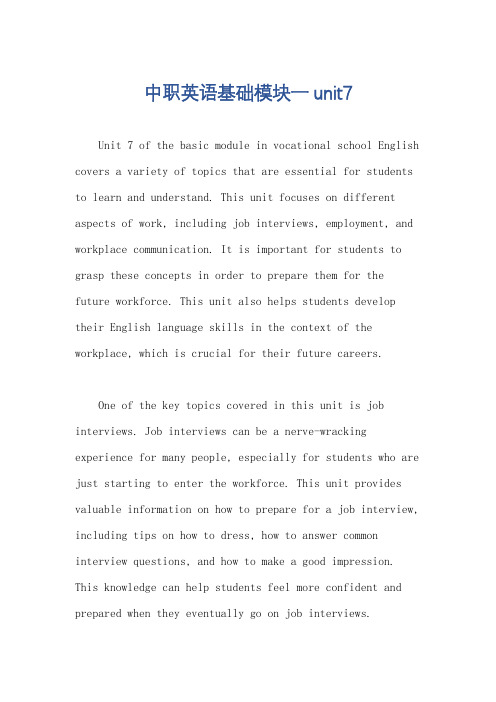
中职英语基础模块一unit7Unit 7 of the basic module in vocational school English covers a variety of topics that are essential for students to learn and understand. This unit focuses on different aspects of work, including job interviews, employment, and workplace communication. It is important for students to grasp these concepts in order to prepare them for thefuture workforce. This unit also helps students develop their English language skills in the context of the workplace, which is crucial for their future careers.One of the key topics covered in this unit is job interviews. Job interviews can be a nerve-wracking experience for many people, especially for students who are just starting to enter the workforce. This unit provides valuable information on how to prepare for a job interview, including tips on how to dress, how to answer common interview questions, and how to make a good impression. This knowledge can help students feel more confident and prepared when they eventually go on job interviews.Another important aspect of this unit is learning about employment rights and responsibilities. Students need to understand their rights as employees, as well as their responsibilities in the workplace. This includes knowing about minimum wage laws, workplace safety regulations, and anti-discrimination laws. Understanding these concepts is essential for students to protect themselves and advocate for their rights in the workplace.Additionally, this unit also covers workplace communication, which is a crucial skill for any job. Effective communication is essential for building strong relationships with coworkers, supervisors, and clients. This unit provides students with the opportunity topractice their communication skills through role-playing activities and discussions. By learning how to communicate effectively in the workplace, students can improve their chances of success in their future careers.Furthermore, this unit emphasizes the importance of professionalism in the workplace. Students learn about theimportance of being punctual, reliable, and respectful in a professional setting. They also learn about thesignificance of maintaining a positive attitude and working well with others. These lessons are crucial for students to develop a strong work ethic and professional demeanor, which are essential for success in any job.In conclusion, Unit 7 of the basic module in vocational school English covers a wide range of important topics related to work and employment. By learning about job interviews, employment rights and responsibilities, workplace communication, and professionalism, students can develop the skills and knowledge they need to succeed in the workforce. This unit provides valuable information and practical experience that can help students prepare for their future careers. Overall, this unit is an essential part of vocational school education and plays a crucialrole in shaping students into successful and competent professionals.。
中职英语基础模块2(修订版)第七单元Unit-7单词
smart
/smɑːt/ adj. 智能的;机智的
基础模块2(修订版) U7 Invention and Innovation
delivery guarantee
theater smart online
online
/ˌɒnˈlaɪn/ adj. 在线的;网上的
feature besides benefit
benefit
/ˈbenɪfɪt/ v. 有益于
基础模块2(修订版) U7 Invention and Innovation
in the beginning
be doubtful about
in a way
Internet of Things (IoT)
基础模块2(修订版) U7 Invention and Innovation
基础模块2
Unit 7 Invention and Innovation
基础模块2(修订版) U7 Invention and Innovation
virtual software
video operate
pick
virtual
基础模块2(修订版) U7 Invention and Innovation
delivery guarantee
theater smart online
theater
/ˈθɪətə(r)/ n. 电影院;剧场
基础模块2(修订版) U7 Invention and Innovation
delivery guarantee
theater smart online
delivery
/dɪ'lɪv(ə)rɪ/ n. 递送
中等职业英语基础模块第一册单词
中等职业英语基础模块第一册单词Unit 1: Greetings and Introductions1. Hello / Hi- Used when greeting someone for the first time or as a general informal greeting. - Example: Hello! How are you?2. Goodbye / Bye- Used when ending a conversation or when leaving.- Example: Bye! See you later.3. How are you?- Used to ask about someone's well-being or state.- Example: How are you feeling today?4. Nice to meet you- Used to express pleasure in meeting someone for the first time.- Example: Nice to meet you. My name is Mark.5. What's your name?- Used to ask for someone's name.- Example: What's your name, please?6. My name is...- Used to introduce oneself and provide the name.- Example: My name is Emily. Nice to meet you.7. Where are you from?- Used to ask about someone's place of origin.- Example: Where are you from originally?8. I'm from...- Used to state one's place of origin.- Example: I'm from France. What about you?9. How old are you?- Used to ask about someone's age.- Example: May I ask how old you are?10. I'm... years old.- Used to state one's age.- Example: I'm 25 years old. How about you?Unit 2: Numbers1. Zero- The numerical symbol representing the value of nothing or no quantity. - Example: There are zero seats available.- The numerical symbol representing the value of a single unit or entity. - Example: I have one sister.3. Two- The numerical symbol representing the value of two units or entities. - Example: I need two cups of coffee.4. Three- The numerical symbol representing the value of three units or entities. - Example: I have three cats.5. Four- The numerical symbol representing the value of four units or entities. - Example: There are four chairs in the room.6. Five- The numerical symbol representing the value of five units or entities. - Example: I have five fingers on each hand.7. Six- The numerical symbol representing the value of six units or entities. - Example: She has six books on her shelf.- The numerical symbol representing the value of seven units or entities. - Example: We'll meet at seven o'clock.9. Eight- The numerical symbol representing the value of eight units or entities. - Example: I'll be there in eight minutes.10. Nine- The numerical symbol representing the value of nine units or entities. - Example: There are nine planets in our solar system.Unit 3: Colors1. Red- The color associated with passion, love, and intensity.- Example: She was wearing a stunning red dress.2. Blue- The color associated with calmness, serenity, and stability.- Example: The sky is a beautiful shade of blue today.3. Yellow- The color associated with happiness, joy, and energy.- Example: The sunflowers are bright yellow.4. Green- The color associated with nature, growth, and freshness.- Example: The leaves on the trees are a vibrant green.5. Orange- The color associated with enthusiasm, creativity, and warmth. - Example: He painted the walls in a lovely shade of orange. 6. Purple- The color associated with royalty, luxury, and power.- Example: The queen wore a regal purple gown.7. Pink- The color associated with femininity, sweetness, and kindness. - Example: The baby girl's room is painted in soft pink.8. Brown- The color associated with earthiness, stability, and reliability. - Example: His eyes are a warm shade of brown.9. Black- The color associated with formality, elegance, and mystery.- Example: She wore a black evening gown to the party.10. White- The color associated with purity, innocence, and cleanliness.- Example: The bride wore a white wedding dress.This document provides a comprehensive list of basic words related to the Middle Vocational English Module 1. The topics covered include greetings and introductions, numbers, and colors. Each unit contains ten words, along with brief explanations and examples. These words will help you build a solid foundation in the English language.。
外研社中职英语基础模块修订版-UNIT2
What an amazing place!
Look at the picture and discuss:
1. Which country is famous for windmills? 2. What else do you know about the country?
.
You’ll be able to:
Susan: There were so many tourists, and the traffic was really
busy during that time.
Bob: It must be very noisy, too. Right?
Susan: That’s true, but I still like the city. People there are nice
Jenny: What an amazing place!
参考译文
珍妮: 你好,戴维!你能给我讲一些关于澳大利亚的事 情吗?
戴维: 当然。澳大利亚的首都是堪培拉。 珍妮: 哦。澳大利亚有什么特别的动物吗? 戴维: 袋鼠是澳大利亚特有的。 珍妮: 那里有著名的自然景观吗? 戴维: 有啊。其中就有艾尔斯岩。它是一整块巨大的岩
Listening and Speaking
2 Listen and practice. 听录音,练习谈论城市。
Bob: Hi, Susan. Long time no see.
Susan: Yes. I just got back from London.
Bob: Really? How did you find the city?
5 Listen again and act. 再听录音,根据提示表演对话。
(完整版)中职英语基础模块unit1
Section B Listening and Speaking
Warm-up
Dialo English Learning
Objectives
1. 能够辨别 /ɔː/ 和/aʊ/,/ɒ/和/əʊ/,/k/和/ɡ/,/j/和/dʒ/的 在句中发音的不同,并能正确掌握其发音。 2. 熟练掌握本单元出现的词汇、短语和句型,并能用 学过的短语、句型谈论英语学习。 3. 熟练掌握一般将来时态的用法。 4. 熟练掌握名片的基本写法。
Group 1 /ɔː/ and /aʊ/
Script (1)My uncle has a horse. (2)They shout at each other.
Group 2 /ɒ/and əʊ/
Script (1) That clock must be fast. (2) Tom wears a red coat today.
Warm-up Here are some sentences related to English learning. Please match them with the corresponding pictures.
5 Little Tom can’t remember new words he has learnt.
Activities
Warm-up Here are some sentences related to English learning. Please match them with the corresponding pictures.
